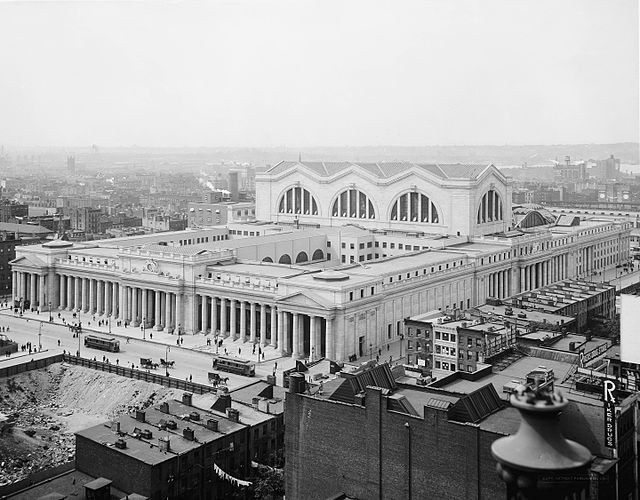When my family was visiting New York City a couple of years ago, we took a train out of Pennsylvania Station on the way up to Montreal for the second half of our vacation. It was raining a little as we walked from the hotel, but I thought we’d still have no trouble finding the station. After a few minutes we gave up and had to ask someone where the entrance was.
We couldn’t find it because it looked like every other street corner in Manhattan. But it wasn’t always like that. It used to look like this:

In the 1960s, facing declining train usage and financial problems, the Pennsylvania Railroad sold the rights to everything above ground and the incredible station pictured above was demolished. It was only afterwards, when it actually happened, that everyone fully realized what they had lost. Determined to not let other beautiful architectural landmarks get destroyed, the city passed a law to restrict similar demolition. Grand Central Terminal was preserved because of the lesson learned from letting Pennsylvania Station go.
I was thinking about this story — failing to do the right thing, but applying that knowledge to the next thing — while re-reading Marco’s excellent post on the future of podcasting. In it, he lays out the technical details for how podcasting works today, and makes the case for leaving it alone. I especially like this part, on his determination to keep Overcast a sort of pure MP3 client:
By the way, while I often get pitched on garbage podcast-listening-behavioral-data integrations, I’m never adding such tracking to Overcast. Never. The biggest reason I made a free, mass-market podcast app was so I could take stands like this.
I should have realized it earlier, but I don’t think I really connected all of Marco’s goals with Overcast until Daniel Jalkut and I had him on Core Intuition episode 200. We talked about many of these same themes as Marco was finishing up Overcast 2.0.
There’s also a great discussion on Upgrade about this. It starts about halfway through.
In a response to Marco on MacStories, Federico Viticci writes about the parallel trend in the web industry toward centralized services like Facebook and Medium that allow “content professionals” to monetize their writing. In doing so, those writers give up many of the benefits of the open web:
But the great thing about the free and decentralized web is that the aforementioned web platforms are optional and they're alternatives to an existing open field where independent makers can do whatever they want. I can own my content, offer my RSS feed to anyone, and resist the temptation of slowing down my website with 10 different JavaScript plugins to monitor what my users do. No one is forcing me to agree to the terms of a platform.
While the open web still exists, we really dropped the ball protecting and strengthening it. Fewer people’s first choice for publishing is to start a web site hosted at their own domain. Like the destruction of Pennsylvania Station, sometimes you only know in hindsight that you’ve made a mistake. We were so caught up in Twitter and Facebook that we let the open web crumble. I’m not giving up — I think we can get people excited about blogging and owning their own content again — but it would have been easier if we had realized what we lost earlier.
Reading posts like Marco’s and Federico’s, and listening to Jason and Myke on Upgrade, I’m convinced that podcasting will remain open because we know better now. As a community we can learn from the mistakes with the web and the threats of closed platforms, making sure that podcasting is preserved as a simple technology that no one controls.